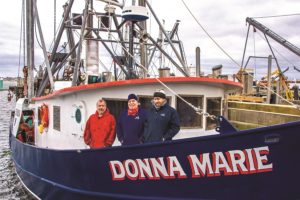WELLFLEET — With restaurants closed, fishermen have lost their usual income. But the people who grow, harvest, and market Outer Cape crops from land and sea are experimenting with strategies to make things work, at least for now. The result may be a deeper commitment to producing and consuming local foods.
Dave Seitler of Wellfleet, who shellfishes in the wild, said that he typically makes most of his annual income in spring — while grants are still getting set up for the season, he supplies wild oysters to an understocked market.
But with the pandemic and closure of restaurants, “Nothing is selling,” Seitler said. Many shellfishermen now find themselves suddenly out of work.
For Seitler and others who depend on the Outer Cape’s seasonal economy, the timing of the virus crisis could not be worse. Since spring is usually his busiest season, Seitler just invested in new equipment and repairs on his boat. “I thought I’d make a ton of money the next few months,” he said.
Fisherman Kurt Martin of Orleans usually sets up herring weirs in Nantucket Sound at this time of year. But he needs a crew of at least four working in close quarters to do so. Since social distancing isn’t possible, Martin has decided to forgo the weirs this season.
But he is thinking small to survive. “Maybe I’ll set some lobster traps earlier and catch on a small scale for local sales,” Martin said. “The wholesale company I sell to has laid off about everybody.”

Restaurant closures are hurting wholesalers and, in turn, the producers who supply them.
Mac Hay, an owner of Mac’s Seafood, sells four times as many oysters to restaurants than at his seafood markets. “Not everyone knows how to shuck an oyster,” Hay said. “We can only buy as much from our fishermen as we can sell.” He estimated that shellfishermen have seen their sales drop from $2,000 or $3,000 a week to maybe $200.
An added worry for local shellfishermen, Hay said, is that they are mostly self-employed and without access to the safety net employees have. “That’s why people need to be aware of the importance of buying local,” he said.
Wholesalers are trying to adapt with an eye to helping producers stay afloat.
One move Mac’s is making is a weekly giveaway of fresh fish to residents and staff at Liberty Commons in Chatham and Seashore Point in Provincetown. The idea is not only to provide a healthy gift to our most vulnerable populations but to shore up the jobs that in normal times support sales, according to John Newman, chief business officer of Mac’s.
“It’s a small gesture,” Newman said, that is also aimed at “keeping fishermen, wholesale plant workers, and delivery truck drivers employed.”
Justin Dalby, co-owner of Holbrook Oyster, a smaller wholesaler, said his company is also hurting and has laid off some employees. Holbrook usually sells about 6,000 oysters a week to restaurants. That number is down to about 2,000. But they’ve added Seitler’s clams to their offerings. “They’re really helping me out,” Seitler said.
They’re also shifting gears by offering free local delivery from Provincetown to Orleans using their refrigerated van.
Holbrook is selling at wholesale prices: 65 cents per oyster. The way Dalby sees it, this is a way to help out people who don’t want to leave their homes and may have less to spend, too. The company can’t do that forever, but they’re focusing on the immediate need. “We’re just doing it to keep people happy and eating well,” Dalby said.

Chris King of Cape Tip Seafood is taking the same approach, adding home delivery that’s free to seniors from Provincetown to Wellfleet and doing “contactless” pickups. “We’re not driven by dollars,” King said. “We’re doing this because we see a sense of urgency and want to provide food that’s produced here to the community.”
Meanwhile, on Farms
Farmers who work local land have never scaled up to serve larger markets the way our fishermen have. For these very small-scale producers, there seems to be a chance of actually expanding because of the pandemic.
Dave DeWitt owns Dave’s Greens, an organic farm in Truro. Before coronavirus was an issue, DeWitt decided to double his community-supported agriculture program. “I’m glad I did,” Dewitt said. The program has already sold out for the coming season.
One change DeWitt has made as he thinks ahead is to increase his production of fast-growing greens. “I planted one of the largest greenhouses full of salad mix,” he said. “Normally we don’t do that.” The greens should be ready in a few weeks, when he’ll start selling to families nearby. DeWitt is also considering deliveries for elderly customers.
Drew Locke of Truro raises organic chickens, the majority of which he typically sells to restaurants. This year, restaurant demand has been replaced by individuals, who have been buying in bulk. “My numbers have gone up 10 times in two weeks. It’s been absolutely nuts,” he said. “My whole distribution has changed.”
Locke sells frozen chickens through the winter and into early summer, when he begins to process new birds for restaurants. He’s already sold the supply that would, in a normal year, have lasted until June. Locke will soon receive a new batch of 50 baby chicks, which will be fully grown in about eight weeks.
Despite the high demand, Locke is concerned about the long-term repercussions of the pandemic. “I’m excited about the influx of local people buying,” he said. But he is worried about losing restaurant sales. “They’re 70 percent of my business. Ceraldi takes 20 birds a week. No home owner is going to be doing that.”
It’s Going to Take Grit
Everyone the Independent spoke with emphasized that the Cape is capable of producing plenty of food. While the selection, timing, and distribution of what’s produced here has long been tuned to the tourist season and, in the case of seafood, to larger markets, the hope is that, for the interim, focusing on local needs will help producers weather the crisis.
Locke believes this could be a good thing in the long haul. “I hope people realize how important local food is,” he said. “I hope they see what farms do and support us.”
Looking farther out, what’s daunting for shellfishermen is that income now means reaping in the future. Without capital to invest in grants and plant new seed, oystermen will not be harvesting a year from now. “We might not work for 12 to 18 months,” Seitler said.
King emphasized that adapting to new situations is vital to the fishing industry. He’s looking to history for strength. In Provincetown, he said, “Fishing was the first industry. It’ll be the last one, and it’s the only one right now.”
Seitler agreed. “It’s not like we’re used to a stable market,” he said. “The best fisherman adapts to change. Wellfleet has the grittiest people on the face of the earth, and I don’t see anyone backing down from this one. Everybody will try to help, and there’s no way that people will just give up.”



